Unit 4 Humour Lesson 2 Why Do We Need Humour?课件(共36张,内嵌音视频)北师大版(2019)选择性必修第二册(共37页ppt)
文档属性
| 名称 | Unit 4 Humour Lesson 2 Why Do We Need Humour?课件(共36张,内嵌音视频)北师大版(2019)选择性必修第二册(共37页ppt) | 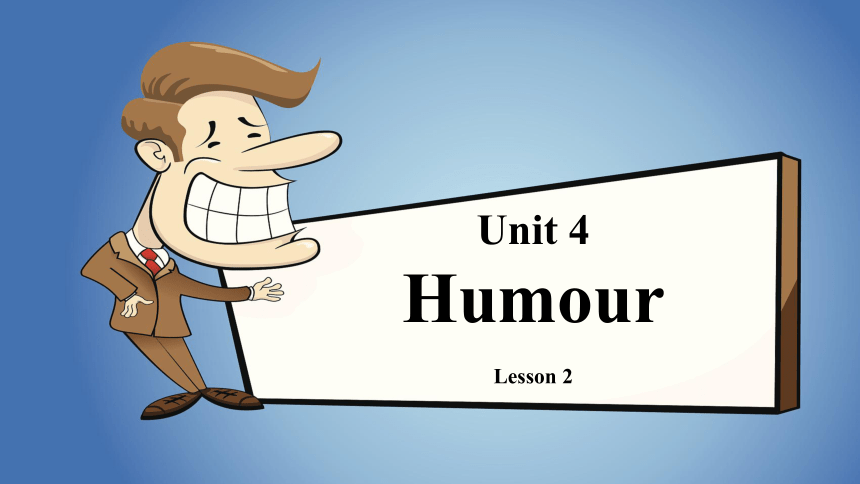 | |
| 格式 | pptx | ||
| 文件大小 | 34.3MB | ||
| 资源类型 | 教案 | ||
| 版本资源 | 北师大版(2019) | ||
| 科目 | 英语 | ||
| 更新时间 | 2025-08-01 11:05:52 | ||
图片预览

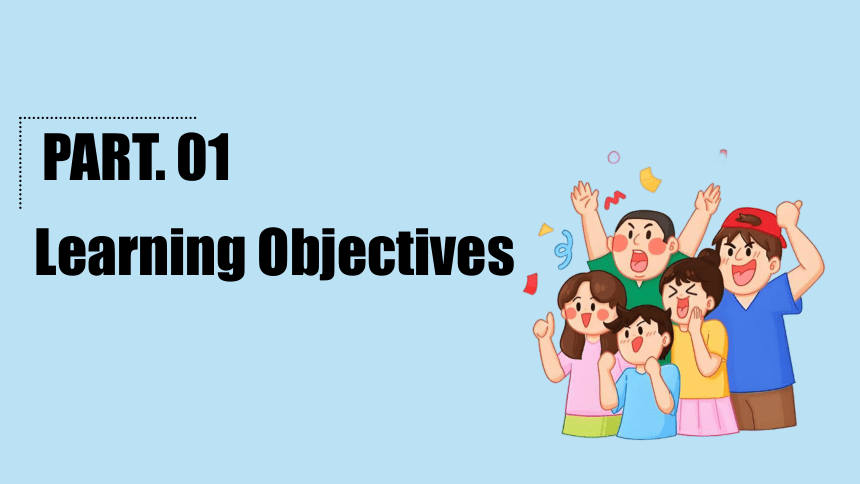
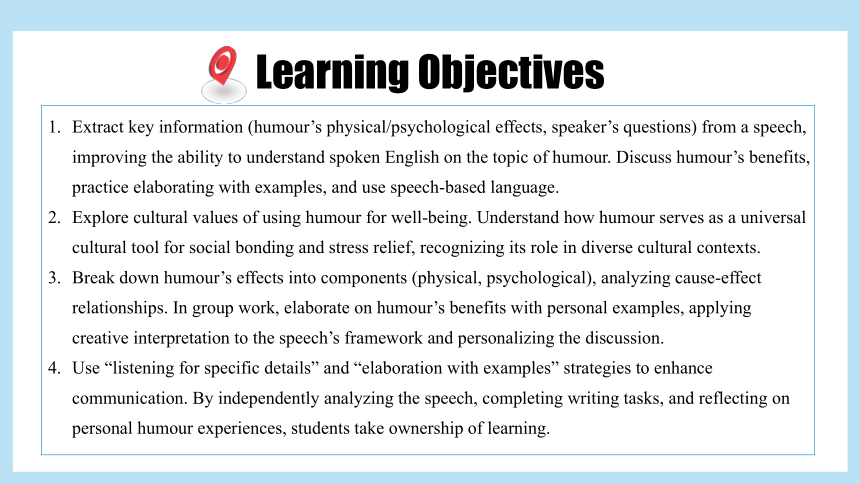
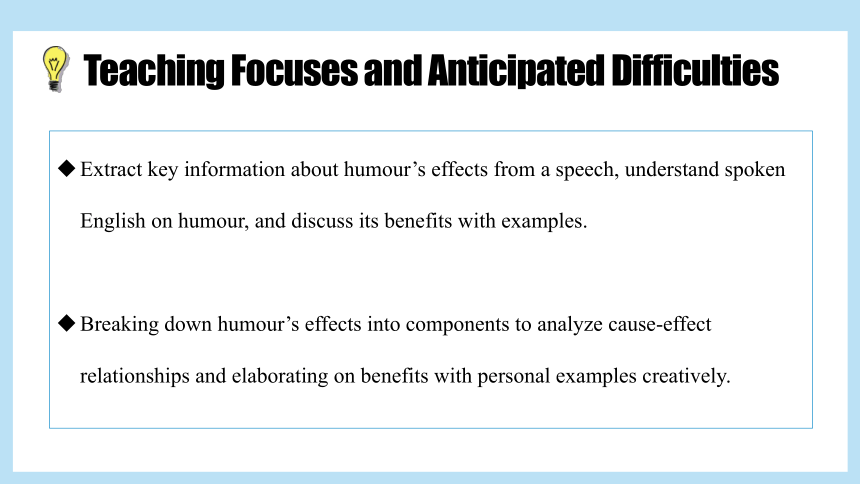
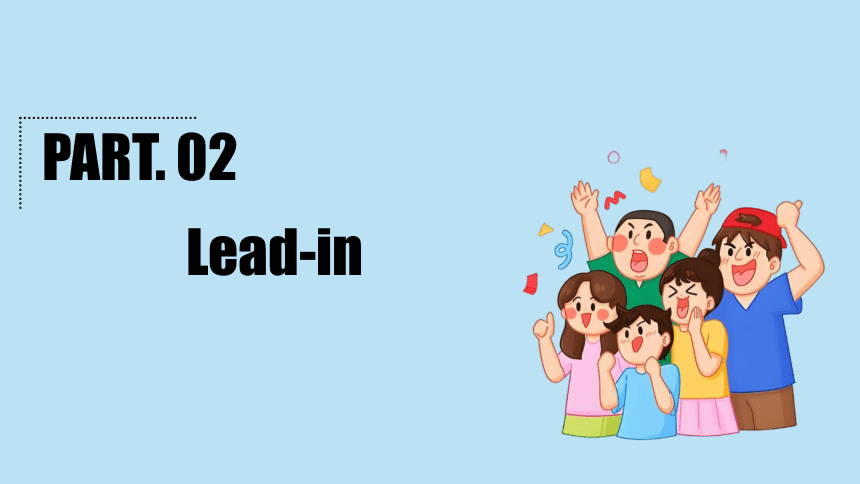
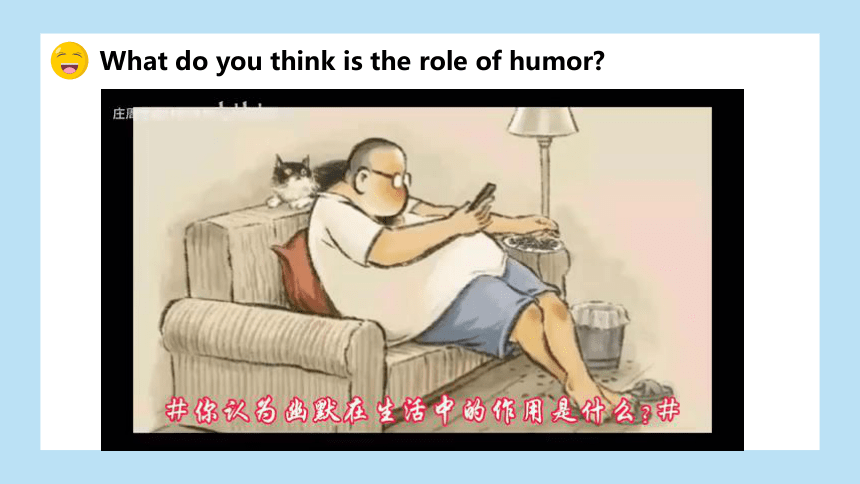
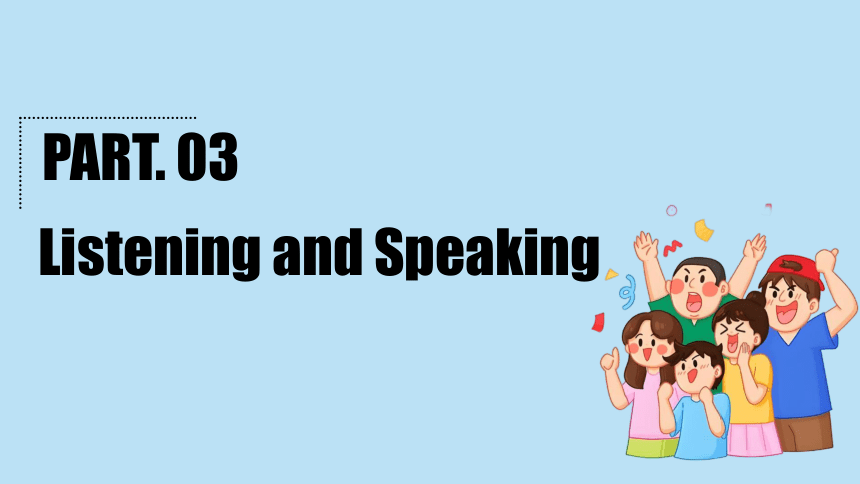
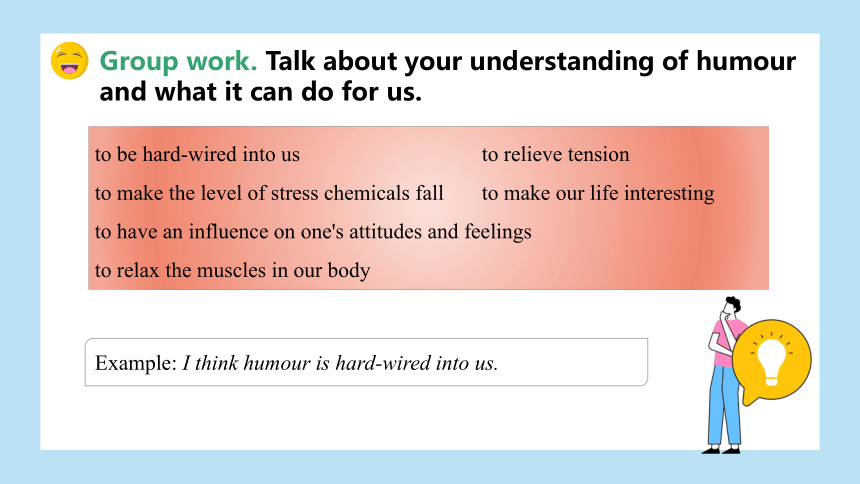
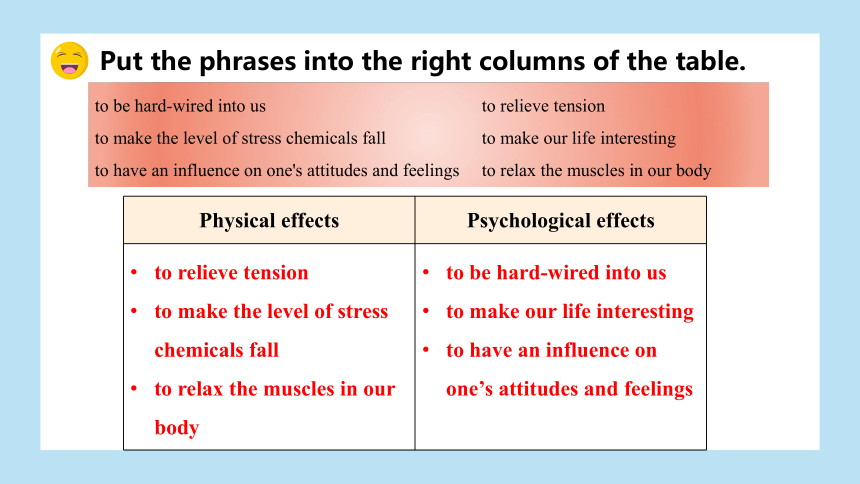
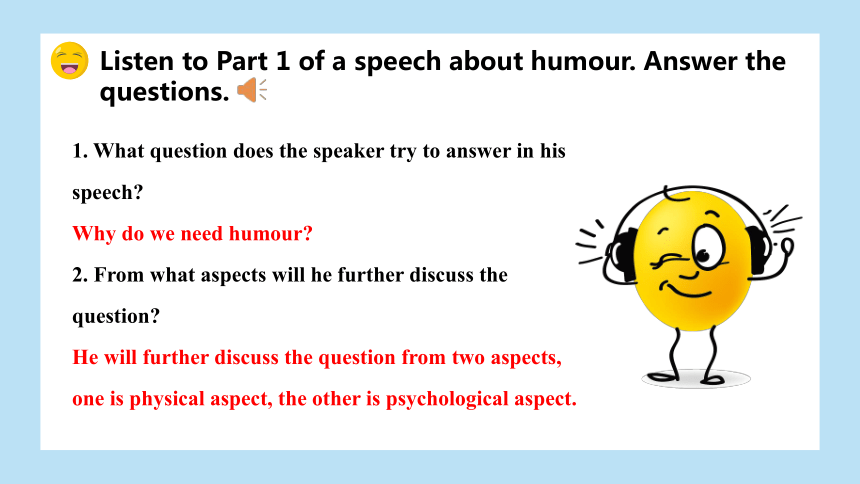

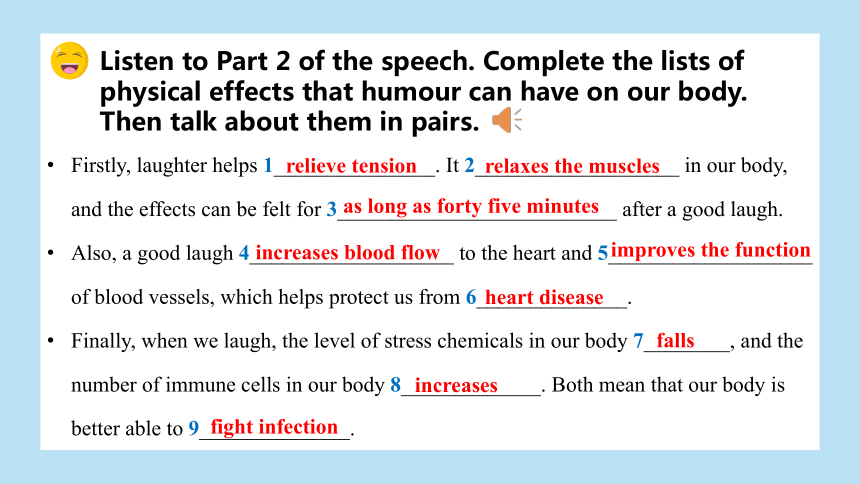
文档简介
(共36张PPT)
Unit 4
Humour
Lesson 2
Learning Objectives
PART. 01
Understand the daily study and life of British middle school students by watching videos. Based on your own daily study and life, compare the study and life in Chinese and British schools, and find out the similarities and differences between the two. Talk about your first impression of high school life, and have a preliminary perception of the study and life in the senior high school stage.
Learning Objectives
Extract key information (humour’s physical/psychological effects, speaker’s questions) from a speech, improving the ability to understand spoken English on the topic of humour. Discuss humour’s benefits, practice elaborating with examples, and use speech-based language.
Explore cultural values of using humour for well-being. Understand how humour serves as a universal cultural tool for social bonding and stress relief, recognizing its role in diverse cultural contexts.
Break down humour’s effects into components (physical, psychological), analyzing cause-effect relationships. In group work, elaborate on humour’s benefits with personal examples, applying creative interpretation to the speech’s framework and personalizing the discussion.
Use “listening for specific details” and “elaboration with examples” strategies to enhance communication. By independently analyzing the speech, completing writing tasks, and reflecting on personal humour experiences, students take ownership of learning.
Understand the daily study and life of British middle school students by watching videos. Based on your own daily study and life, compare the study and life in Chinese and British schools, and find out the similarities and differences between the two. Talk about your first impression of high school life, and have a preliminary perception of the study and life in the senior high school stage.
Teaching Focuses and Anticipated Difficulties
Extract key information about humour’s effects from a speech, understand spoken English on humour, and discuss its benefits with examples.
Breaking down humour’s effects into components to analyze cause-effect relationships and elaborating on benefits with personal examples creatively.
Lead-in
PART. 02
What do you think is the role of humor
Listening and Speaking
PART. 03
Group work. Talk about your understanding of humour and what it can do for us.
to be hard-wired into us to relieve tension
to make the level of stress chemicals fall to make our life interesting
to have an influence on one's attitudes and feelings
to relax the muscles in our body
Example: I think humour is hard-wired into us.
Put the phrases into the right columns of the table.
to be hard-wired into us to relieve tension
to make the level of stress chemicals fall to make our life interesting
to have an influence on one's attitudes and feelings to relax the muscles in our body
Physical effects Psychological effects
to relieve tension
to make the level of stress chemicals fall
to relax the muscles in our body
to be hard-wired into us
to make our life interesting
to have an influence on one’s attitudes and feelings
Listen to Part 1 of a speech about humour. Answer the questions.
1. What question does the speaker try to answer in his speech
Why do we need humour
2. From what aspects will he further discuss the question
He will further discuss the question from two aspects, one is physical aspect, the other is psychological aspect.
Good morning and thank you for joining me today. The title of my speech today is “Why do we need humour ” I believe that all of us enjoy watching a comedy film or hearing a good joke, because it makes us laugh all the time. Babies laugh long before they can speak. It’s almost as if humour is hard-wired into us. So there must be some kind of benefit to it. What can humour do for us According to recent research, humour has both physical and psychological effects.
Transcript
Listen to Part 2 of the plete the lists of physical effects that humour can have on our body. Then talk about them in pairs.
Firstly, laughter helps 1_______________. It 2___________________ in our body, and the effects can be felt for 3__________________________ after a good laugh.
Also, a good laugh 4___________________ to the heart and 5___________________ of blood vessels, which helps protect us from 6______________.
Finally, when we laugh, the level of stress chemicals in our body 7________, and the number of immune cells in our body 8_____________. Both mean that our body is better able to 9______________.
relieve tension
relaxes the muscles
as long as forty five minutes
increases blood flow
improves the function
heart disease
falls
increases
fight infection
Let’s talk about the physical effects. Firstly, laughter helps relieve tension. It relaxes the muscles in our body, and the effects can be felt for as long as 45 minutes after a good laugh. Also, a good laugh increases blood flow to the heart and improves the function of blood vessels, which helps protect us from heart disease. Finally, when we laugh, the level of stress chemicals in our body falls, and the number of immune cells in our body increases. Both mean that our body is better able to fight infection.
Transcript
Listen to Part 3. Complete the information about the two psychological effects of humour on our mind.
The two-way effect between smiling and mood:
When we’re happy,
_________________.
When we smile, even if we don’t feel like it, it can also _________________.
we naturally smile
make us feel happy
Far-reaching effects of humour:
It means that it will have a _______________ on how we live. If we are in a bad mood, we are likely to express _____________________________; and this makes those around us down, too. But if we always try to be positive and funny, people will ___________________ and feel energised.
great influence
negative attitudes and feelings
enjoy our company
There is a song that says, “Smile, though your heart is breaking.” Does it mean there is a relation between smiling and mood The answer is YES. Humour also has psychological effects on our mind. Scientists have proved that there is a two-way effect between smiling and mood: when we’re happy, we naturally smile; and when we smile, even if we don’t feel like it, it can also make us feel happy.
Besides, when we incorporate humour as part of our life attitude, it can have far-reaching effects. What does “far-reaching effects” mean It means that it will have a great influence on how we live. We all know that if we are in a bad mood, we are likely to express negative attitudes and feelings; and this makes those around us down, too. But if we always try to be positive and funny, people will enjoy our company and feel energised by it.
That’s the end of my talk. I hope you’ll benefit from humour in your lives. Thank you. And now I’m happy to answer any questions...
Transcript
Listen to the speech again. Write down the questions that the speaker used in his speech. Then summarise the speaker's answers to the questions.
Using Questions to Draw Attention
Some speakers use questions from time to time to draw the audience’s attention. Then they provide answers to the questions. In this way, it helps the audience to understand the points they are making. Listen carefully to the questions and focus on the answers.
Skill Builder
Listen to the speech again. Write down the questions that the speaker used in his speech. Then summarise the speaker's answers to the questions.
________________________________________________________________________________________________________________________________________________________________________________________________________________________________________________________________________________________________________________________________________________________________________________________________________________________________________________________________________________________________________________________
1. What can humour do for us
Humour has both physical and psychological effects.
2. Does it mean there is a relation between smiling and mood
YES. Humour also has psychological effects on our mind.
3. What does “far-reaching effects” mean
It means it will have a great influence on how we live.
Listen to a dialogue and find out Mike's embarrassing situation and his way to handle it.
Mike’s embarrassing situation:
He kept on ________________________________.
His way to handle the situation:
He made ________________________.
He just started laughing and said, "Oh dear, one of these days I'm going to ____________________!"
getting the host's name wrong
a joke about himself
forget my own name
M: Hi, Jennifer.
J: Oh, hello, Mike. How was the party
M: It was great! But I really embarrassed myself.
J: Really What did you do
M: I kept on getting the host’s name wrong! When we got there, I ____________ him to someone as “Richard”. But his name is Cliff.
J: Oh dear! That’s ____________.
M: Very awkward. Then, right at the end of the party, I went to him and said — in front of everybody — “Thanks for the wonderful party, Richard”. Everybody else got really _______. After a while, somebody ___________ in my ear. “His name is Cliff, not Richard.” I felt so embarrassed. I couldn’t stop blushing.
Listen again and fill in the blanks with the words you hear.
introduced
awkward
quiet
whispered
J: How did you handle the situation
M: I made a joke about myself and that helped solve all the embarrassments.
J: How clever! Tell me more about it.
M: Well, you know I’d recently read an article that introduced some ways to solve an awkward situation. One example of this is that you can use humour to get people to laugh at you. For instance, if you ___________ pour coffee all over yourself, you can laugh at yourself or make a joke about it. You can say, for example, “My T-shirt also wants to have a cup of coffee.” That way, other people can laugh too, without being rude about laughing at someone else’s _________. Laughter is a great way to make people feel ___________ in an awkward situation. So I just started laughing and said, “Oh dear, one of these days I’m going to forget my own name!” Everybody laughed, even Richard — I mean Cliff.
J: You’re so smart! __________ is really a great way to deal with an awkward situation.
Listen again and fill in the blanks with the words you hear.
accidentally
expense
comfortable
Humour
Listen and plete the Talk Builder.
Elaborating with Examples
1 _________________ is that you can use humour to get people to laugh at you.
2 _________________, if you accidentally pour coffee all over yourself, you can laugh at yourself or make a joke about it.
3 You can say, _______________, “My T-shirt also wants to have a cup of coffee.”
Talk Builder
For example
For instance
One example of this
One example of this
For instance
for example
The following phrases can be used when you say “for example”.
such as
let’s say …
examples include …
imagine that
in a similar case …
to illustrate …
to give you an idea …
suppose that …
Group work Talk about the benefits of humour based on your own experience and elaborate on them with examples.
Vocabulary
1. tension
tense adj. 紧张的;绷紧的;拉紧的 vi. & vt. (使)紧张 n. 时态
be tense about 对……感到紧张
be/get tensed up 变得神经紧张
例题:
The ________(tense) at the dinner table was obvious — no one spoke, and forks clinked loudly against plates after the argument.
tension
Vocabulary
2. mood
in a good/bad mood 心情好/不好
put sb into a good mood 让某人有个好心情
in no mood for doing sth. 没有心情做某事
in the mood for/to do sth. 有心情做某事
例题:
With exams approaching, the students were in no mood for __________(play) video games, focusing instead on their textbooks.
playing
Vocabulary
3. whisper
whisper to each other 在某人耳旁小声说某事
whisper to sb 对某人耳语
It is whispered that... 私下说……
in a whisper/in whispers 低声地;悄声地
例题:
It is __________(whisper) that the restaurant’s secret recipe was passed down from a royal chef, adding to its mysterious charm.
whispered
Vocabulary
4. embarrassment
embarrass vt. 使难堪,使尴尬
embarrassed adj. 尴尬的;陷入困境的
embarrassing adj. 令人尴尬的
to one’s embarrassment 令某人尴尬的是
be/feel embarrassed to do sth 对做某事感到尴尬
be/feel embarrassed about/at... 对……感到难为情/不知所措
例题:
While some people get easily ____________(embarrass) by small mistakes, others brush them off and keep going.
embarrassed
Vocabulary
5. expense
at sb’s expense 嘲笑某人
at the expense of… 在牺牲(损害)……的情况下
spare no expense 不惜费用;不惜代价
expensive adj. 昂贵的;价格高的
例题:
The joke, told _______ his expense, left him feeling embarrassed, even though everyone else laughed loudly.
at
Exercise
PART. 04
1. Long-term stress can cause serious p____________(心理的) problems, such as anxiety and difficulty sleeping, which affect both mood and physical health.
2. While children often get sick easily, adults with healthy habits are more i_________ (有免疫力的) to seasonal flu and other infections.
3. The invention of the internet has had f___________(影响深远的) effects on human life, changing how we work, communicate, and even think about the world.
4. Each living organism is made of tiny c______(细胞), which work together to perform functions like growing, reproducing, and converting food into energy.
sychological
Exercise: 单词拼写
mmune
ar-reaching
ells
1. A short break with a cup of tea often __________(energy) employees, helping them return to work with renewed concentration.
2. Washing hands regularly with soap can reduce the risk of __________(infect), as it removes germs that cause colds and flu.
3. She ____________(accidental) deleted the important document from her computer, spending the whole afternoon trying to recover it with software.
4. His face turned red with _______________(embarrass) when he mispronounced the teacher’s name in front of the whole class.
energises
Exercise: 用所给词的适当形式填空
infection
accidentally
embarrassment
Summary
PART. 05
添加标题
ADD THE TITLE HERE
Lesson 2
Vocabulary
Extract key information (humour’s physical/psychological effects, speaker’s questions) from a speech.
Discuss humour’s benefits, practice elaborating with examples, and use speech-based language.
Listening
tension, mood, whisper, embarrassment, expense
Homework
PART. 06
Write about the benefits of humour based on your own experience and elaborate on them with examples.
Homework
See you next class!
Unit 4
Humour
Lesson 2
Learning Objectives
PART. 01
Understand the daily study and life of British middle school students by watching videos. Based on your own daily study and life, compare the study and life in Chinese and British schools, and find out the similarities and differences between the two. Talk about your first impression of high school life, and have a preliminary perception of the study and life in the senior high school stage.
Learning Objectives
Extract key information (humour’s physical/psychological effects, speaker’s questions) from a speech, improving the ability to understand spoken English on the topic of humour. Discuss humour’s benefits, practice elaborating with examples, and use speech-based language.
Explore cultural values of using humour for well-being. Understand how humour serves as a universal cultural tool for social bonding and stress relief, recognizing its role in diverse cultural contexts.
Break down humour’s effects into components (physical, psychological), analyzing cause-effect relationships. In group work, elaborate on humour’s benefits with personal examples, applying creative interpretation to the speech’s framework and personalizing the discussion.
Use “listening for specific details” and “elaboration with examples” strategies to enhance communication. By independently analyzing the speech, completing writing tasks, and reflecting on personal humour experiences, students take ownership of learning.
Understand the daily study and life of British middle school students by watching videos. Based on your own daily study and life, compare the study and life in Chinese and British schools, and find out the similarities and differences between the two. Talk about your first impression of high school life, and have a preliminary perception of the study and life in the senior high school stage.
Teaching Focuses and Anticipated Difficulties
Extract key information about humour’s effects from a speech, understand spoken English on humour, and discuss its benefits with examples.
Breaking down humour’s effects into components to analyze cause-effect relationships and elaborating on benefits with personal examples creatively.
Lead-in
PART. 02
What do you think is the role of humor
Listening and Speaking
PART. 03
Group work. Talk about your understanding of humour and what it can do for us.
to be hard-wired into us to relieve tension
to make the level of stress chemicals fall to make our life interesting
to have an influence on one's attitudes and feelings
to relax the muscles in our body
Example: I think humour is hard-wired into us.
Put the phrases into the right columns of the table.
to be hard-wired into us to relieve tension
to make the level of stress chemicals fall to make our life interesting
to have an influence on one's attitudes and feelings to relax the muscles in our body
Physical effects Psychological effects
to relieve tension
to make the level of stress chemicals fall
to relax the muscles in our body
to be hard-wired into us
to make our life interesting
to have an influence on one’s attitudes and feelings
Listen to Part 1 of a speech about humour. Answer the questions.
1. What question does the speaker try to answer in his speech
Why do we need humour
2. From what aspects will he further discuss the question
He will further discuss the question from two aspects, one is physical aspect, the other is psychological aspect.
Good morning and thank you for joining me today. The title of my speech today is “Why do we need humour ” I believe that all of us enjoy watching a comedy film or hearing a good joke, because it makes us laugh all the time. Babies laugh long before they can speak. It’s almost as if humour is hard-wired into us. So there must be some kind of benefit to it. What can humour do for us According to recent research, humour has both physical and psychological effects.
Transcript
Listen to Part 2 of the plete the lists of physical effects that humour can have on our body. Then talk about them in pairs.
Firstly, laughter helps 1_______________. It 2___________________ in our body, and the effects can be felt for 3__________________________ after a good laugh.
Also, a good laugh 4___________________ to the heart and 5___________________ of blood vessels, which helps protect us from 6______________.
Finally, when we laugh, the level of stress chemicals in our body 7________, and the number of immune cells in our body 8_____________. Both mean that our body is better able to 9______________.
relieve tension
relaxes the muscles
as long as forty five minutes
increases blood flow
improves the function
heart disease
falls
increases
fight infection
Let’s talk about the physical effects. Firstly, laughter helps relieve tension. It relaxes the muscles in our body, and the effects can be felt for as long as 45 minutes after a good laugh. Also, a good laugh increases blood flow to the heart and improves the function of blood vessels, which helps protect us from heart disease. Finally, when we laugh, the level of stress chemicals in our body falls, and the number of immune cells in our body increases. Both mean that our body is better able to fight infection.
Transcript
Listen to Part 3. Complete the information about the two psychological effects of humour on our mind.
The two-way effect between smiling and mood:
When we’re happy,
_________________.
When we smile, even if we don’t feel like it, it can also _________________.
we naturally smile
make us feel happy
Far-reaching effects of humour:
It means that it will have a _______________ on how we live. If we are in a bad mood, we are likely to express _____________________________; and this makes those around us down, too. But if we always try to be positive and funny, people will ___________________ and feel energised.
great influence
negative attitudes and feelings
enjoy our company
There is a song that says, “Smile, though your heart is breaking.” Does it mean there is a relation between smiling and mood The answer is YES. Humour also has psychological effects on our mind. Scientists have proved that there is a two-way effect between smiling and mood: when we’re happy, we naturally smile; and when we smile, even if we don’t feel like it, it can also make us feel happy.
Besides, when we incorporate humour as part of our life attitude, it can have far-reaching effects. What does “far-reaching effects” mean It means that it will have a great influence on how we live. We all know that if we are in a bad mood, we are likely to express negative attitudes and feelings; and this makes those around us down, too. But if we always try to be positive and funny, people will enjoy our company and feel energised by it.
That’s the end of my talk. I hope you’ll benefit from humour in your lives. Thank you. And now I’m happy to answer any questions...
Transcript
Listen to the speech again. Write down the questions that the speaker used in his speech. Then summarise the speaker's answers to the questions.
Using Questions to Draw Attention
Some speakers use questions from time to time to draw the audience’s attention. Then they provide answers to the questions. In this way, it helps the audience to understand the points they are making. Listen carefully to the questions and focus on the answers.
Skill Builder
Listen to the speech again. Write down the questions that the speaker used in his speech. Then summarise the speaker's answers to the questions.
________________________________________________________________________________________________________________________________________________________________________________________________________________________________________________________________________________________________________________________________________________________________________________________________________________________________________________________________________________________________________________________
1. What can humour do for us
Humour has both physical and psychological effects.
2. Does it mean there is a relation between smiling and mood
YES. Humour also has psychological effects on our mind.
3. What does “far-reaching effects” mean
It means it will have a great influence on how we live.
Listen to a dialogue and find out Mike's embarrassing situation and his way to handle it.
Mike’s embarrassing situation:
He kept on ________________________________.
His way to handle the situation:
He made ________________________.
He just started laughing and said, "Oh dear, one of these days I'm going to ____________________!"
getting the host's name wrong
a joke about himself
forget my own name
M: Hi, Jennifer.
J: Oh, hello, Mike. How was the party
M: It was great! But I really embarrassed myself.
J: Really What did you do
M: I kept on getting the host’s name wrong! When we got there, I ____________ him to someone as “Richard”. But his name is Cliff.
J: Oh dear! That’s ____________.
M: Very awkward. Then, right at the end of the party, I went to him and said — in front of everybody — “Thanks for the wonderful party, Richard”. Everybody else got really _______. After a while, somebody ___________ in my ear. “His name is Cliff, not Richard.” I felt so embarrassed. I couldn’t stop blushing.
Listen again and fill in the blanks with the words you hear.
introduced
awkward
quiet
whispered
J: How did you handle the situation
M: I made a joke about myself and that helped solve all the embarrassments.
J: How clever! Tell me more about it.
M: Well, you know I’d recently read an article that introduced some ways to solve an awkward situation. One example of this is that you can use humour to get people to laugh at you. For instance, if you ___________ pour coffee all over yourself, you can laugh at yourself or make a joke about it. You can say, for example, “My T-shirt also wants to have a cup of coffee.” That way, other people can laugh too, without being rude about laughing at someone else’s _________. Laughter is a great way to make people feel ___________ in an awkward situation. So I just started laughing and said, “Oh dear, one of these days I’m going to forget my own name!” Everybody laughed, even Richard — I mean Cliff.
J: You’re so smart! __________ is really a great way to deal with an awkward situation.
Listen again and fill in the blanks with the words you hear.
accidentally
expense
comfortable
Humour
Listen and plete the Talk Builder.
Elaborating with Examples
1 _________________ is that you can use humour to get people to laugh at you.
2 _________________, if you accidentally pour coffee all over yourself, you can laugh at yourself or make a joke about it.
3 You can say, _______________, “My T-shirt also wants to have a cup of coffee.”
Talk Builder
For example
For instance
One example of this
One example of this
For instance
for example
The following phrases can be used when you say “for example”.
such as
let’s say …
examples include …
imagine that
in a similar case …
to illustrate …
to give you an idea …
suppose that …
Group work Talk about the benefits of humour based on your own experience and elaborate on them with examples.
Vocabulary
1. tension
tense adj. 紧张的;绷紧的;拉紧的 vi. & vt. (使)紧张 n. 时态
be tense about 对……感到紧张
be/get tensed up 变得神经紧张
例题:
The ________(tense) at the dinner table was obvious — no one spoke, and forks clinked loudly against plates after the argument.
tension
Vocabulary
2. mood
in a good/bad mood 心情好/不好
put sb into a good mood 让某人有个好心情
in no mood for doing sth. 没有心情做某事
in the mood for/to do sth. 有心情做某事
例题:
With exams approaching, the students were in no mood for __________(play) video games, focusing instead on their textbooks.
playing
Vocabulary
3. whisper
whisper to each other 在某人耳旁小声说某事
whisper to sb 对某人耳语
It is whispered that... 私下说……
in a whisper/in whispers 低声地;悄声地
例题:
It is __________(whisper) that the restaurant’s secret recipe was passed down from a royal chef, adding to its mysterious charm.
whispered
Vocabulary
4. embarrassment
embarrass vt. 使难堪,使尴尬
embarrassed adj. 尴尬的;陷入困境的
embarrassing adj. 令人尴尬的
to one’s embarrassment 令某人尴尬的是
be/feel embarrassed to do sth 对做某事感到尴尬
be/feel embarrassed about/at... 对……感到难为情/不知所措
例题:
While some people get easily ____________(embarrass) by small mistakes, others brush them off and keep going.
embarrassed
Vocabulary
5. expense
at sb’s expense 嘲笑某人
at the expense of… 在牺牲(损害)……的情况下
spare no expense 不惜费用;不惜代价
expensive adj. 昂贵的;价格高的
例题:
The joke, told _______ his expense, left him feeling embarrassed, even though everyone else laughed loudly.
at
Exercise
PART. 04
1. Long-term stress can cause serious p____________(心理的) problems, such as anxiety and difficulty sleeping, which affect both mood and physical health.
2. While children often get sick easily, adults with healthy habits are more i_________ (有免疫力的) to seasonal flu and other infections.
3. The invention of the internet has had f___________(影响深远的) effects on human life, changing how we work, communicate, and even think about the world.
4. Each living organism is made of tiny c______(细胞), which work together to perform functions like growing, reproducing, and converting food into energy.
sychological
Exercise: 单词拼写
mmune
ar-reaching
ells
1. A short break with a cup of tea often __________(energy) employees, helping them return to work with renewed concentration.
2. Washing hands regularly with soap can reduce the risk of __________(infect), as it removes germs that cause colds and flu.
3. She ____________(accidental) deleted the important document from her computer, spending the whole afternoon trying to recover it with software.
4. His face turned red with _______________(embarrass) when he mispronounced the teacher’s name in front of the whole class.
energises
Exercise: 用所给词的适当形式填空
infection
accidentally
embarrassment
Summary
PART. 05
添加标题
ADD THE TITLE HERE
Lesson 2
Vocabulary
Extract key information (humour’s physical/psychological effects, speaker’s questions) from a speech.
Discuss humour’s benefits, practice elaborating with examples, and use speech-based language.
Listening
tension, mood, whisper, embarrassment, expense
Homework
PART. 06
Write about the benefits of humour based on your own experience and elaborate on them with examples.
Homework
See you next class!
同课章节目录
- Unit 4 Humour
- Lesson 1 What’s So Funny?
- Lesson 2 Why Do We Need Humour?
- Lesson 3 My Favourite Comedian
- Unit 5 Education
- Lesson 1 Enlightening a Mind
- Lesson 2 The Objectives of Education
- Lesson 3 Understanding
- Unit 6 The Media
- Lesson 1 From Page to Screen
- Lesson 2 Questions about Media
- Lesson 3 The Advertising Game
